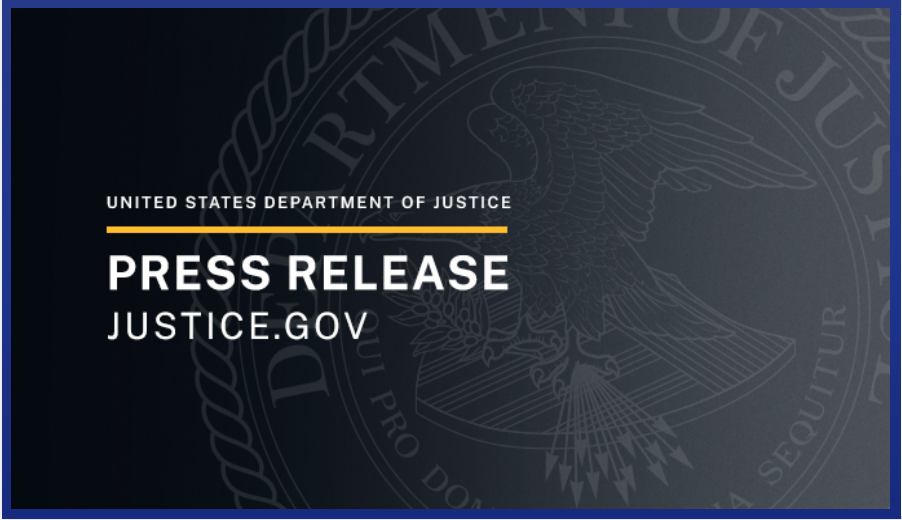A federal jury has convicted Ji Wang, 63, of Painted Post, N.Y., of two counts of economic espionage, one count of theft of trade secrets, one count of attempted economic espionage, and one count of attempted theft of trade secrets. Assistant Attorney General for National Security John A. Eisenberg, together with U.S. Attorney Michael DiGiacomo for the Western District of New York, announced the verdict.
“Yesterday, a federal jury found Wang guilty of stealing sensitive defense research from his employer and attempting to use it to pursue personal profit at the expense our national security,” said Assistant Attorney General for National Security John A. Eisenberg. “We are committed to combating economic espionage and holding accountable those who disregard our export-control laws and the security of U.S. technology. This verdict reaffirms that such betrayals of trust will not go unpunished.”
“This conviction demonstrates the importance of protecting trade secrets developed in the United States, especially those with military applications,” said U.S. Attorney DiGiacomo. “My office will continue pursue and prosecute those that steal such information.”
Wang was born in China and immigrated to the United States in 1998 to work for Corning Incorporated. Between 2002 and 2007, Wang was assigned to work on a joint research and development project funded by the Defense Advanced Research Projects Agency (“DARPA”) and Corning. The goal of the 5-year, $11.4 million project was to develop optical fibers for high-powered lasers with military and commercial applications. DARPA and Corning aimed to increase the power of fiber lasers by more than a factor of 1000. DARPA sought to develop this technology to create laser weapons capable of shooting down drones and missiles.
On or about July 1, 2016, Wang stole hundreds of files that contained non-public data generated during the DARPA project, including trade-secret manufacturing technology that would have enabled him to fabricate all manner of specialty optical fibers, including for fiber lasers.
Ten days before Wang stole the trade secret files, he had applied for China’s Thousand Talents Plan Award. The Thousand Talents Plan Award was an initiative by the Chinese government aimed at people who were born in China and immigrated to the United States, to study or work in science and technology fields. The Thousand Talents Plan Award incentivized these people to return to China by promising millions of dollars of investment to award recipients who returned to China. Two months after Wang stole the trade secret files, he was selected to receive a Thousand Talents Plan Award.
Wang was negotiating with Chinese government entities to start a specialty fiber business in China from at least 2014 through 2017. Wang was negotiating to receive tens of millions of dollars in investment from Chinese government entities, who would have been shareholders in his new venture. Wang’s business plans showed that he was planning to use the stolen trade-secret files to start this business in China. Wang’s business plans also touted the military applications of the technology. In one such business plan, which Wang submitted to a Chinese government entity, he advertised that specialty fibers “can also be installed on military vehicles,” including “tanks.” Wang claimed that such use of the technology on military vehicles could “be key to deciding victory or defeat.” Ultimately, law enforcement disrupted Wang’s efforts before he was able to start a new business and exploit the technology he stole.
“Mr. Wang stole sensitive technology that Corning, Inc. and DARPA spent millions of dollars developing so he could line his own pockets and help our adversaries undermine U.S. national security,” said Assistant Director Roman Rozhavsky of the FBI’s Counterintelligence Division. “For years, China’s government has waged a vast economic espionage campaign designed to put our nation at risk and American companies out of business. This conviction makes clear that the FBI and our partners will continue to hold accountable anyone looking to steal U.S. innovation for our enemies.”
“The Bureau of Industry and Security remains committed to working alongside our law enforcement and industry partners to prevent the unlawful transfer of sensitive technologies,” said Jonathan Carson, Special Agent-in-Charge of the New York Field Office of the Department of Commerce Bureau of Industry and Security, Office of Export Enforcement.
The verdict is the result of an investigation by Special Agents of the Federal Bureau of Investigation, acting under the direction of Special Agent In-Charge Philip Tejera, and Special Agents of the Department of Commerce, Office of Export Enforcement, New York Field Office acting under the direction of Special Agent-in-Charge Jonathan Carson. Additional assistance was provided by Homeland Security Investigations in Detroit, Michigan. The case was prosecuted by Assistant United States Attorney Meghan K. McGuire of the Western District of New York and Trial Attorneys Nicholas Hunter and Brendan Geary of the Counterintelligence and Export Control Section of the National Security Division.
Economic espionage carries a maximum penalty of 15 years in prison and theft of trade secrets carries a maximum sentence of 10 years in prison. Sentencing is scheduled for April 15, 2026, at 2:00 p.m. before U.S. District Judge Frank P. Geraci, Jr., who presided over the trial.



